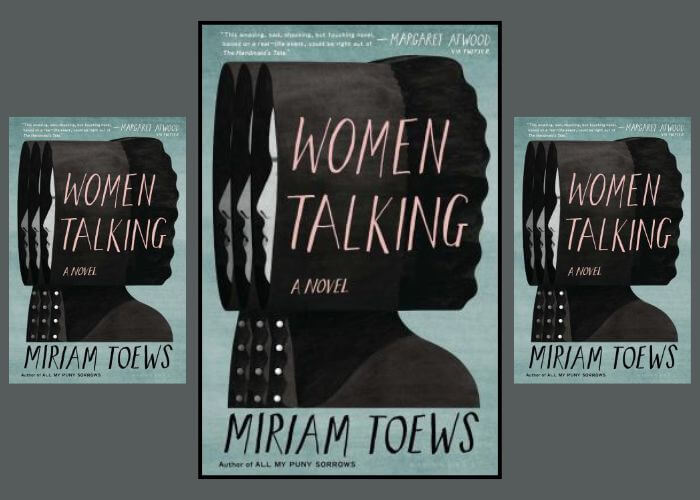Blog
Women Talking by Miriam Toews – Book Review

Introduction
The power of women’s voices in literature has never been more crucial than in today’s world, where stories of resilience and courage continue to shape our understanding of human dignity. Miriam Toews’ groundbreaking novel “Women Talking” stands as a testament to this power, drawing inspiration from true events that occurred in a Mennonite colony in Bolivia. Through this remarkable work, Toews transforms a horrific real-world situation into a profound meditation on faith, forgiveness, and female agency, creating what many consider her most important contribution to contemporary literature.
Book Overview
“Women Talking“ by Miriam Toews has garnered widespread critical acclaim since its publication, establishing itself as a significant work in modern feminist literature. The novel presents a compelling plot summary that follows eight women in an isolated Mennonite community as they gather to make an unprecedented decision about their collective future.
Set within the confines of a remote colony, the story unfolds as these women of the colony grapple with the aftermath of systematic abuse perpetrated by men of the colony. The central premise revolves around a crucial meeting where the women are talking about three possible paths forward: stay and fight, leave for the world outside their community, or forgive the men and maintain the status quo.
The group of women includes diverse voices, each representing different perspectives on how to respond to their traumatic circumstances. What makes this book by Miriam Toews particularly compelling is how these women have learned to find strength in their collective voice, despite being unable even to speak the language of the country and having limited knowledge of the world outside their insular community.
Character Analysis
Miriam Toews has written a cast of unforgettable characters who embody the spectrum of human responses to trauma and oppression. Among the women of Molotschna, Ona emerges as a philosophical voice, often serving as the moral compass for the group’s discussions. Her character brings depth and spirituality to the conversations, helping to ground the women’s deliberations in both practical and ethical considerations.
The diversity within this group of women reflects the complexity of human nature itself. Each woman brings her own perspective, shaped by personal experiences and individual temperament. Some advocate for radical action, while others seek more measured approaches to their shared dilemma.
August serves as the male narrator, occupying a unique position as someone who can read or write and serves as the scribe for the women’s meetings. His role highlights the educational disparities within the Mennonite community while also providing a male perspective that remains respectful and supportive of the women’s agency.
Major Themes
Faith vs. Doubt
One of the most powerful themes in “Women Talking” is the tension between religious faith and doubt. The women in the colony must wrestle with their deep-seated beliefs while confronting the reality that religious authority has failed to protect them. This internal struggle forms the backbone of their philosophical discussions.
Forgiveness and Justice
The question of whether to forgive the men who have harmed them becomes central to the women’s deliberations. Toews explores the complexity of forgiveness, particularly when it comes to forgiving unforgivable acts. The novel doesn’t offer easy answers but instead presents the full spectrum of perspectives on this difficult moral question.
Women’s Agency and Voice
Despite being marginalized within their patriarchal society, these women of the colony find ways to assert their agency. The very act of gathering to discuss their future represents a revolutionary step toward self-determination. Their decision to protect themselves and their daughters becomes a powerful statement about women’s right to safety and autonomy.
Education and Knowledge
The transformative power of literacy and learning runs throughout the narrative. The women’s limited access to education has kept them isolated from the world outside their community, yet their discussions reveal profound wisdom and insight. The novel suggests that true education comes not just from books but from the courage to question and think critically.
Writing Style and Structure
Miriam Toews’s approach to storytelling in this novel is both innovative and deeply effective. The book is structured as a series of meeting minutes, with the narrative unfolding through dialogue and discussion rather than traditional plot progression. This format allows Toews to focus on the philosophical and emotional depth of the characters’ conversations.
The dialogue-driven narrative technique creates an intimate atmosphere, making readers feel as though they are sitting in on these crucial conversations. The author’s ability to balance heavy philosophical discussion with emotional authenticity demonstrates her skill as a writer who can tackle difficult subjects with both sensitivity and power.
Historical and Social Context
“Women Talking” is based on real events that occurred in Bolivia, where women in a Mennonite colony were systematically drugged and assaulted. This connection to true events gives the novel additional weight and urgency, transforming it from fiction into a powerful statement about real-world issues.
The novel’s publication coincided with the #MeToo movement, making its themes particularly relevant to contemporary discussions about sexual assault, institutional cover-ups, and women’s rights. The story of these women resonates with countless others who have faced similar struggles for justice and recognition.
Critical Evaluation
“Women Talking” succeeds on multiple levels as both a work of literary fiction and a social commentary. The novel’s greatest strength lies in its nuanced character development and authentic dialogue. Toews manages to give each woman a distinct voice while maintaining the collective nature of their decision-making process.
The philosophical depth of the conversations never feels forced or artificial. Instead, these discussions emerge naturally from the characters’ circumstances and personalities. The author’s background and personal experience with Mennonite communities bring authenticity to the portrayal of this insular world.
While some readers might find the heavy subject matter challenging, the novel’s focus on hope and resilience prevents it from becoming overwhelmingly dark. The women’s determination to create a better future for themselves and their daughters provides an ultimately uplifting message about human capacity for change and growth.
Personal Response and Relevance
Reading “Women Talking” proves to be an emotionally powerful experience that stays with readers long after they finish the final page. The novel’s contemporary relevance cannot be overstated, as it addresses ongoing issues of gender-based violence, institutional protection of abusers, and the struggle for women’s voices to be heard and believed.
The story of a group of women finding their collective voice speaks to universal themes of empowerment and resistance. Perhaps women talking about their experiences and supporting each other represents one of the most powerful tools for social change, both within the novel and in real life.
This book should be read by anyone interested in contemporary feminist literature, stories of resilience, or explorations of faith and moral complexity. However, potential readers should be aware that the novel deals with difficult themes, including sexual assault and religious trauma.
Film Adaptation
The novel’s impact has been further amplified by its successful film adaptation, starring Rooney Mara, Claire Foy, Jessie Buckley, and Frances McDormand. Directed by Sarah Polley, the film brings additional attention to the story while maintaining the integrity of Toews’ original vision. The casting choices, including Ben Whishaw as August, help bring these powerful characters to life on screen.
Conclusion
“Women Talking” by Miriam Toews stands as a remarkable achievement in contemporary literature. The novel successfully transforms a horrific true story into a profound meditation on faith, forgiveness, and female agency. Through the voices of the women in a Mennonite colony, Toews creates a work that is both specific to its setting and universal in its themes.
The story of a Mennonite colony becomes a story about all women who have faced oppression and found the courage to speak out. The novel’s lasting impact lies in its demonstration that even in the most restrictive circumstances, women can find ways to assert their agency and create change.
This book deserves a place among the most important works of contemporary feminist literature. It serves as both a tribute to the real women whose experiences inspired the story and a call to action for readers to listen to and support women’s voices in their own communities.
Rating: 5/5 stars
“Women Talking” is essential reading for anyone seeking to understand the power of collective action, the complexity of forgiveness, and the enduring strength of the human spirit in the face of adversity.
